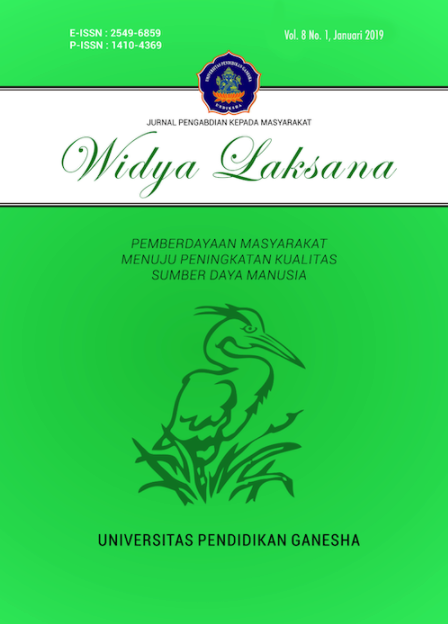MEMPERSIAPKAN KARIR SISWA DI ERA DIGITAL MELALUI PEMAHAMAN TIPOLOGI KEPRIBADIAN DAN DUNIA KERJA
DOI:
https://doi.org/10.23887/jwl.v8i2.17951Abstract
Abstrak
Ketidaktelitian merencanakan karir diprediksi akan terjadi pada siswa kelas XII di SMAN 1 Rambutan, dikarenakan skeptis terhadap diri dan peluang karir yang tersedia, sementara itu di era digital menuntut siswa memiliki preferensi pribadi yang mantap. Oleh karena itu pemahaman tipologi kepribadian bertujuan untuk membantu proses perencanaan karir siswa SMAN 1 Rambutan agar relevan dengan karakteristik pribadi dan tren di era digital. Metode pelaksanaan dilakukan dalam tiga sesi yaitu reframing, pemahaman diri melalui instrumen RIASEC, terkahir diskusi dan simulasi. Hasilnya ditemukan mayoritas peserta memiliki tipologi sosial (51%), diikuti oleh artisitik (18%), dan yang paling rendah adalah investigatif (1%), selain itu siswa dapat mengelompokkan kegiatan yang mendukung pada rencana karier antara lain meningkatkan keahlian yang spesifik (kuliah, mengambil lisensi, dan pelatihan), dan kegiatan yang dapat mengembangkan kemampuan penunjang (kursus singkat bahasa, pemanfaatan sosial media, dan berkomunitas).
Kata kunci: perencanaan karir, era digital, tipologi kepribadian
Abstract
Inaccuracy in career planning was predicted would happen in grade XII SMAN 1 Rambutan, that causes by skeptical of self and career opportunities that are available. Meanwhile, in the digital age, students are required to have good personal preferences. Therefore the personality typology assessment aim to help the process of career planning of students SMAN 1 Rambutan to be relevant to personal characteristics and career trends in digital age. Implementation method held in three sessions i.e. reframing, self-understanding through RIASEC inventory, closing with discussion and simulation. The results found the majority of participants have social typology (51%), followed by artistic (18%), and the lowest is investigative (1%), moreover they can be grouping some activities that support the career plan like upgrading specific skills (taking graduate study, take the licenses, and training), and activities that could develop supporting ability (languages short course, utilization of social media, and community activity).
Keywords : career planning, digital age, personality typology
References
Anwar, M. K. (2017). Model Eksplorasi Karir Sebagai Upaya Persiapan Karir Siswa Dalam Menghadapi Asean Global. Jurnal Konseling Gusjigang, 3(1).
Kumaidi, K., Farida, R., & Haq, A. H. (2017). Skala Minat Kejuruan: Strategi Mengenali Minat Vokasi Siswa., (pp. 553-562). Proceeding 6th University Research Colloquium 2017:Seri Humaniora, Sosial, dan Agama
Savickas, M. L. (2005). The theory and practice of career construction. In S. D. Lent, Career development and counselling: putting theory and research to work (pp. 42–70). Hoboken, NJ: Wiley.
Schlesinger, J., & Pasquarella Daley, L. (2016). Career Development Models for the 21st Century. NACE Journal April 2016, 24-29.
Sugihartini, N., Agustini, K., & Pradnyana, I. M. A. (2017). Pelatihan video editing tingkat smk se-kota singaraja. Widya laksana, 6(2), 172-180.
Suyatna, H., & Nurhasanah, Y. (2017). Sociopreneurship Sebagai Tren Karir Anak Muda. Jurnal Studi Pemuda Vol. 6 No. 1 Mei 2017, 527-237.
World Economic Forum. (2016). The future of jobs: Employment, skills and workforce strategy for the fourth industrial revolution. In Global Challenge Insight Report. Geneva: World Economic Forum.
Wulandari, A. D., Dharmayana, I. W., & Suprapti, A. (2016). Profil kecendrungan pemilihan minat karir berdasarkan tipe kepribadian siswa sma Se-kota bengkulu. Jurnal TRIADIK, Volume 15, No.2, Oktober 2016: 30-42
Downloads
Published
Issue
Section
License
Authors who publish with the Widya Laksana agree to the following terms:- Authors retain copyright and grant the journal the right of first publication with the work simultaneously licensed under a Creative Commons Attribution License (CC BY-SA 4.0) that allows others to share the work with an acknowledgment of the work's authorship and initial publication in this journal
- Authors are able to enter into separate, additional contractual arrangements for the non-exclusive distribution of the journal's published version of the work (e.g., post it to an institutional repository or publish it in a book), with an acknowledgment of its initial publication in this journal.
- Authors are permitted and encouraged to post their work online (e.g., in institutional repositories or on their website) prior to and during the submission process, as it can lead to productive exchanges, as well as earlier and greater citation of published work. (See The Effect of Open Access)



